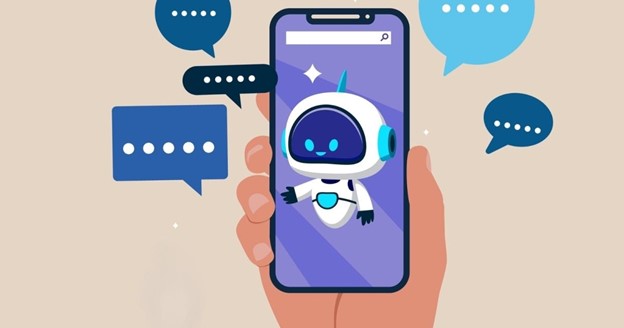To be unique in the ever-changing world of mobile app development, one must be innovative. Apps have evolved from straightforward services to intricate systems that are deeply ingrained in our everyday lives. Of all the technologies influencing this shift, artificial intelligence (AI) is one that really changes things.
AI app development is more than just a catchphrase; it’s a paradigm change that’s changing the way applications work, communicate, and develop. Any forward-thinking app developer must comprehend the implications of AI apps as they become more common.
This article explores the emergence of artificial intelligence (AI) in mobile applications, highlighting its disruptive potential and practical applications.

AI’s Entrance into Mobile Applications
With applications evolving from simple tools to complex platforms, the mobile app market has seen tremendous changes over time. However, nothing has been as ground-breaking as the incorporation of AI into these systems.
The Development of Applications
The journey has been incredible, spanning from the early days of simple mobile games and utilities to today’s multipurpose apps. Applications have evolved as a result of shifting user expectations and technological improvements.
Nonetheless, this progress has sped tremendously when AI was included into apps. Using AI technologies for app development, AI app developers are currently leading this revolution and producing more intelligent, responsive, and intuitive applications.
AI on Phones: A Revolution
The potential for artificial intelligence on phones has increased significantly as smartphones get more and more powerful. AI mobile apps are becoming a basic feature on all smartphones, no longer reserved for expensive models. Artificial intelligence mobile app development company in USA is improving user experiences in ways that were previously unthinkable, from voice assistants to real-time translation tools.
Personalization is one of the most prominent applications of AI in mobile apps. AI programs may provide personalized information and suggestions based on user behavior and preferences, personalizing each user’s experience. This degree of customization was always considered a luxury, but as AI app development advances, it’s quickly turning into a must.
Moreover, app intelligence has significantly improved as a result of the growing use of AI in apps. The applications of today are proactive rather than merely reactive. They even automate repetitive processes and anticipate the demands of the user. Based on user behavior and preferences, AI app developers are, for example, developing systems that can handle money, filter emails, and plan meetings.
Knowing the Development of AI Applications
AI app development is a broad field that uses a variety of constantly changing technology and development approaches. Any app developer must grasp the subtleties of artificial intelligence (AI) as it becomes increasingly ingrained in our digital experiences.
What is AI App Development?
The process of developing apps that make use of artificial intelligence technology to improve usability and functionality is known as AI app development. AI applications, in contrast to ordinary apps, are designed to simulate human intelligence by thinking, learning, and making judgments. It can cover everything from easy chores like email sorting to harder ones like user behavior prediction.
The Toolkit for AI App Developers
It’s important for those who are new to developing AI apps to familiarize themselves with the necessary platforms and technologies. A few of the crucial components are as follows:
- Platforms for Machine Learning: These offer data sets, algorithms, and APIs for model training. Azure Machine Learning and TensorFlow are two examples.
- Tools for Natural Language Processing (NLP): These are necessary for applications like chatbots that communicate with users via text or speech.
- Platforms for Developing AI Applications: In-depth environments such as IBM Watson enable developers to effectively create, train, and implement AI models.
- Neural Network Frameworks: Keras and PyTorch are two well-liked choices for developing deep learning models.
AI’s Effect on App Intelligence
App intelligence has significantly increased as a result of the AI’s integration with applications. AI-powered applications of today are cognitive entities that change, learn, and develop together with their users—they are more than simply tools.
Customization Using AI-Powered Mobile Apps
The unmatched customisation that AI mobile apps can provide is one of their best qualities. These applications can utilize data to their advantage and learn from user interactions to:
- Deliver content to each individual’s preferences.
- Make product suggestions based on your browsing or prior purchases.
- User interfaces can be customized to fit unique usage habits.
AI-Powered App Functionality Enhancement
AI greatly improves an application’s general functioning in addition to customisation. Here’s how to do it:
- Predictive Text and Auto-correction: Keyboards with artificial intelligence (AI) built in can translate text instantly, autocorrect, and anticipate content.
- Image and Voice Recognition: AI has made it possible for apps to recognize things in photos and comprehend voice instructions.
- Real-time Analytics: AI in apps has the ability to evaluate data instantly, giving users immediate feedback and insights.
- Automated Customer Support: AI-driven chatbots and virtual assistants may book appointments, respond to consumer inquiries, and even resolve issues without the need for human intervention.
Practical Steps for Developing AI Apps
Given the complexity of artificial intelligence, starting an AI app development project might seem overwhelming. But developers may use AI to create ground-breaking applications if they have the correct tools and an organized approach.
How to Create an AI Application
A combination of conventional app development techniques and AI-specific procedures is needed to create an AI application. Here’s a detailed how-to:
- Define the Objective: Clearly define the problem that artificial intelligence is intended to address. Having a defined objective is essential, whether it is improving user experience, automating processes, or providing predictive insights.
- Select the Right AI Tools: The right AI tools for app development should be chosen based on the needs of the application. Neural network frameworks and machine learning platforms could be among them.
- Data Gathering: AI is data-driven. Collect pertinent information for the AI model’s training. It might be text, photos, user activity statistics, or any other pertinent information.
- Model Training: Train your AI model with the data that has been gathered. In this stage, the model is fed the data and given the opportunity to learn and provide predictions.
- Integration: Incorporate the mobile app’s learned AI model. Make sure the AI components and the app’s conventional features work together flawlessly.
- Testing: Make sure the AI is operating appropriately by thoroughly testing the app. It involves examining its responses, forecasts, and general performance.
- Deployment and Iteration: Deploy the app when you’re pleased, then continue iteratively. To continuously hone and enhance the AI model, collect data and input from users.
Is it Possible for AI to Code an App?
Even while AI has advanced significantly in a number of fields, fully automating app coding is still a goal for the future. However, by recommending code snippets, spotting problems, and improving code efficiency, AI may help engineers.
AI’s Various Applications in Mobile App Development
AI has many different uses in the field of developing mobile apps. AI offers infinite possibilities, ranging from improving user interfaces to completely changing backend operations.
Using AI in Application Development
AI has a wide-ranging impact on the creation of applications:
- Enhancement of User Experience: AI can provide individualized interfaces, information, and notifications by analyzing user behavior.
- Operational Efficiency: Use AI to automate repetitive operations, improve resource allocation, and simplify workflows.
- Security Enhancements: AI can identify odd trends, possible dangers, and improve biometric authentication procedures, which improves security.
Ideas for AI mobile apps: Beyond Typical Application
Among the creative ways AI is being used in mobile apps are:
- Health Monitoring: Apps that examine user data to offer training routines, dietary advice, and health insights.
- Real-time Translation: Instantaneous translation capabilities for texts, photos, and even audio allow you to overcome language boundaries.
- Shopping with Augmented Reality: AI-powered AR applications let customers visually try things on before they buy them.
- Smart Home Control: Applications that gather user preferences over time and utilize them to effectively operate smart home appliances.
AI-Powered Application Development’s Future
The use of AI in app development is a sign of a new age, not a passing fad. AI technologies will continue to have an impact on application development as they advance and become more widely available.
AI and Application Development’s Future
The direction AI is taking in app development points to a number of emerging trends:
- Hyper-customization: AI will allow applications to anticipate user demands even before they materialize and provide solutions ahead of time, going beyond the existing degrees of personalization.
- Voice-First Applications: As voice assistants become more popular, applications may go from being mostly visual to being voice-first in the future, which will alter how consumers engage with them.
- Integration of Augmented Reality (AR) with Virtual Reality (VR): AI will improve AR and VR applications, increasing their interactivity and responsiveness to user actions.
- Self-evolving Apps: Without the need for regular manual updates, apps will continually learn and adapt to changing surroundings and user preferences.
Concepts for AI Apps: The Next Big Thing
Combining app development with machine learning will result in:
Apps that can forecast user behavior, including travel schedules, buying inclinations, and even possible health problems, are known as behavioral prediction apps.
Interactive learning platforms are educational applications that provide a really customized learning experience by modifying information according to the learner’s knowledge and speed.
Possibilities and Difficulties for AI App Development
While artificial intelligence (AI) has great promise, there are drawbacks as well. It is imperative that every developer of AI apps understand them.
The Price of Developing AI Apps
Integration of AI may need a lot of resources:
- High Initial Investment: It can be expensive to set up AI infrastructure, particularly for small firms.
- Maintenance Costs: Ongoing costs may arise from the ongoing training and upgrading of AI models.
Is AI Capable of Producing Apps? The Truth About Creating AI Apps
Even while AI can help with the app-making process, full automation of app production is still a long way off. But there are also possibilities presented by the challenges:
- Niche Specialization: With AI being more widely used, having a focus on specialist applications might provide you a competitive advantage.
- Collaborative Development: Groundbreaking apps can result from combining human ingenuity with AI’s computational capacity.
- Ethical Considerations: Developing AI programs that are impartial, ethical, and respectful of user privacy will be a major area of attention, providing chances for developers that give these things top priority.
Conclusion
Undoubtedly, the use of AI in mobile app development is revolutionary. It is clear from our exploration of the development of apps, the effects of AI applications, and the prospects for the future that AI is not only a nice-to-have but a must. With AI’s ability to improve user experience, expedite processes, and forecast future trends, the field of AI app development is set to completely change the online environment. Adopting this AI-driven future as developers and companies is essential to remaining relevant and competitive.
Are you prepared to start developing AI apps? With the help of our skilled UK mobile app developers, take advantage of artificial intelligence’s potential in mobile application development services. We can help you with improving app intelligence, developing a new AI-driven platform, or comprehending the subtleties of AI tools for app development. Join us as we explore the future of application development and let’s create together!





Leave a Comment